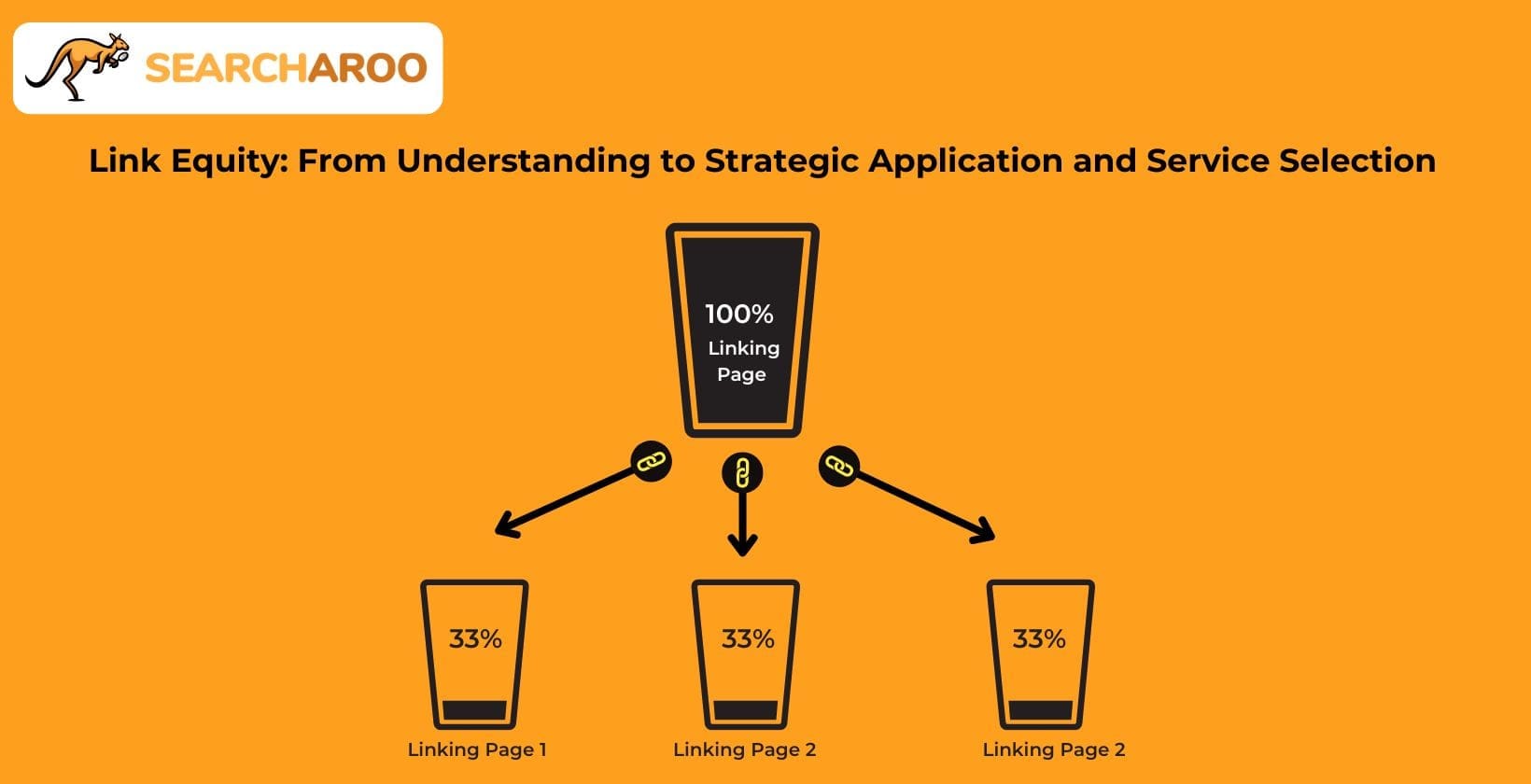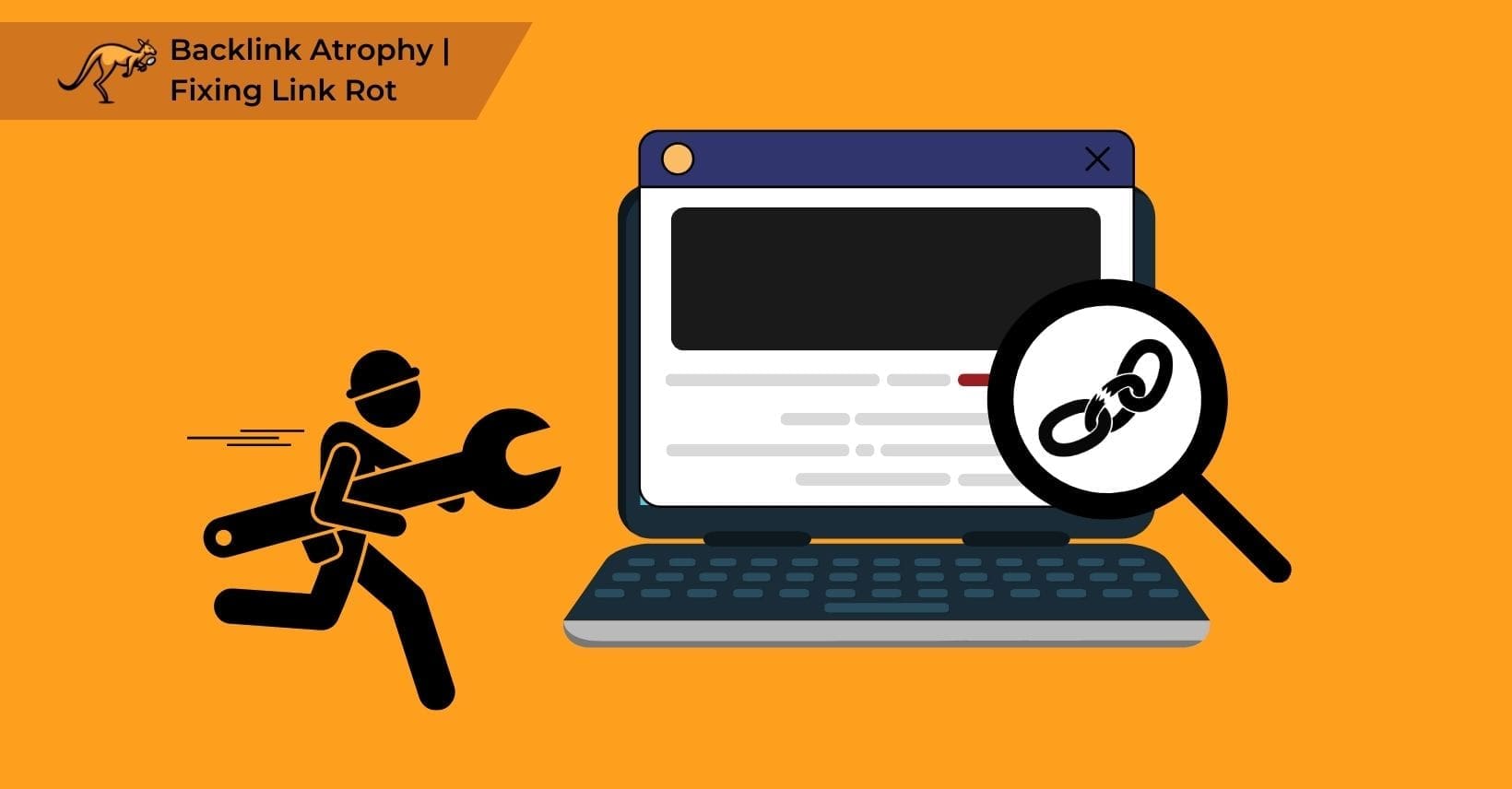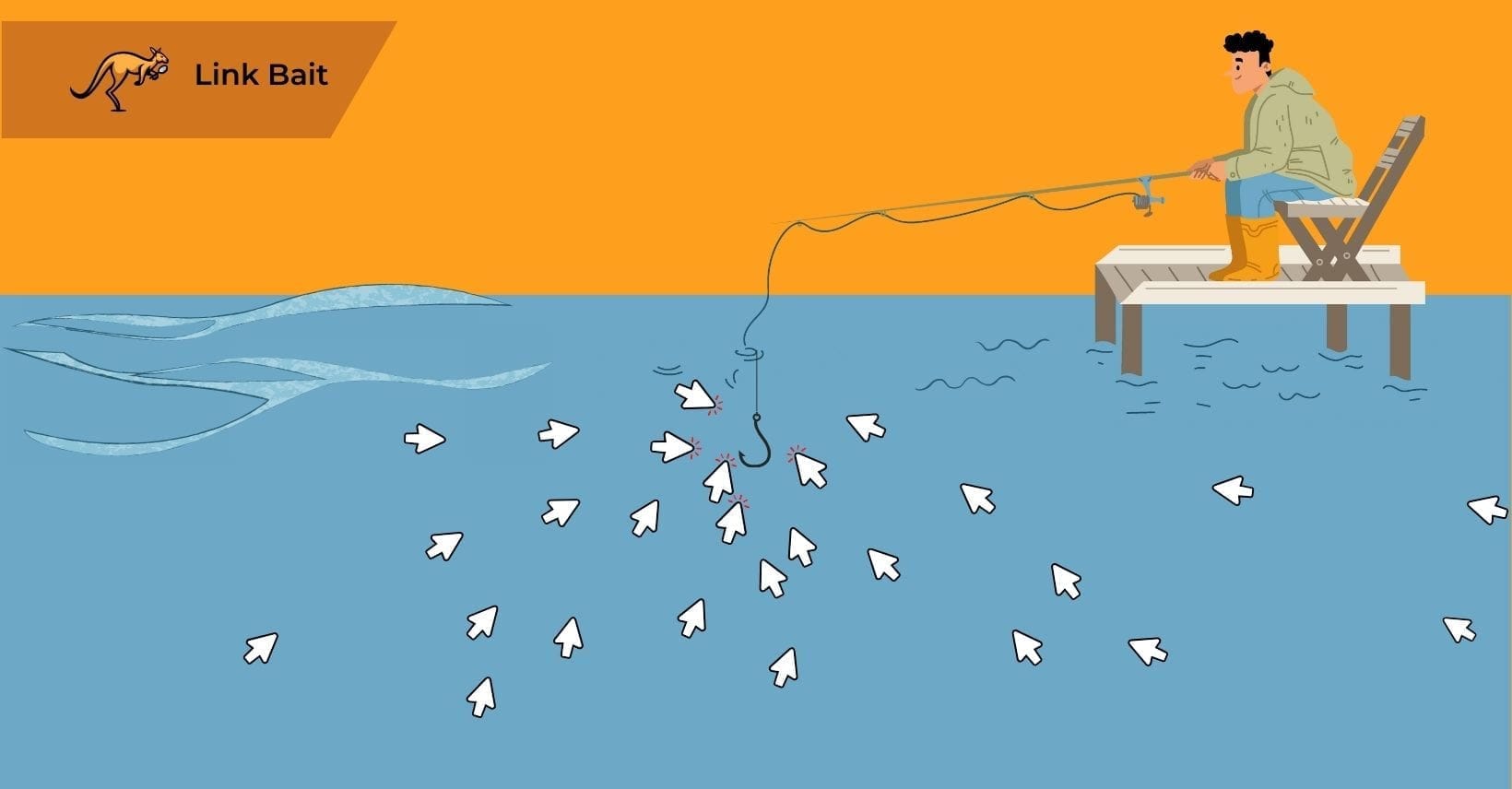Link equity is an important measurement for various search engine optimisation tasks and vital for link building. As a measurement of link strength, it forms the basis of any link’s overall SEO potential and value.
But what is link equity, and how do links pass link equity to boost SEO?
What is Link Equity?
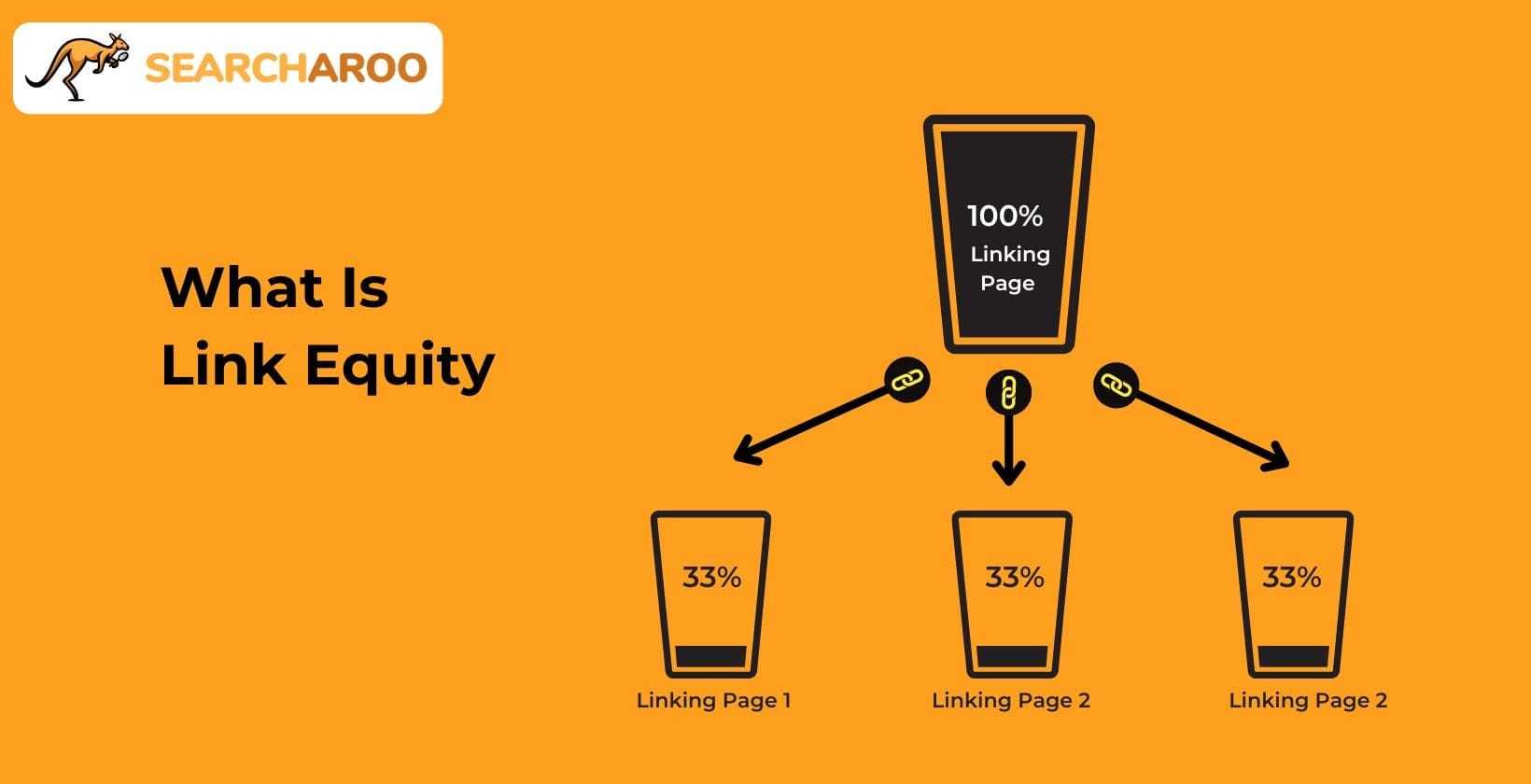
Link equity, or “link juice,” measures a link’s SEO value that passes from one website to another through hyperlinks. Link equity provides a boost to a site’s search engine rankings, with more valuable links delivering stronger ranking improvements.
External links transfer link equity from one domain to another when one site links to another, passing authority that directly impacts search engine rankings. Search platforms consider this transferred link equity as a primary factor when determining search result rankings. Understanding what link equity does is important for optimising your site.
What Does Link Equity Do?
Search platforms want authoritative sites that have a lot of trust placed behind them.
Link equity measures the trust a linking site puts in the linked page it is targeting. This gives the target site more link juice and more authority from one page.
Backlinks create the pathway for link equity transfer, with high-quality backlinks from trusted sites delivering more link equity to boost your web pages’ trustworthiness. Google and other search engines rank these pages higher due to increased domain authority, which measures your site’s accumulated link equity and trust. Understanding how links pass link equity is essential.
How Do Links Pass Link Equity?
When one site links to another, the linking page passes link equity to the linked page; the amount distributed depends on the linking site’s authority, the link’s position on the page, anchor text relevance, and the total number of links on the sending page.
While all links can pass link equity, search platforms typically measure link equity from only one link per pair of target and sender sites. This applies to any link not tagged as “nofollow,” which prevents the link from passing link juice. Understanding this brings us to why link equity is important.
Why is Link Equity Important?
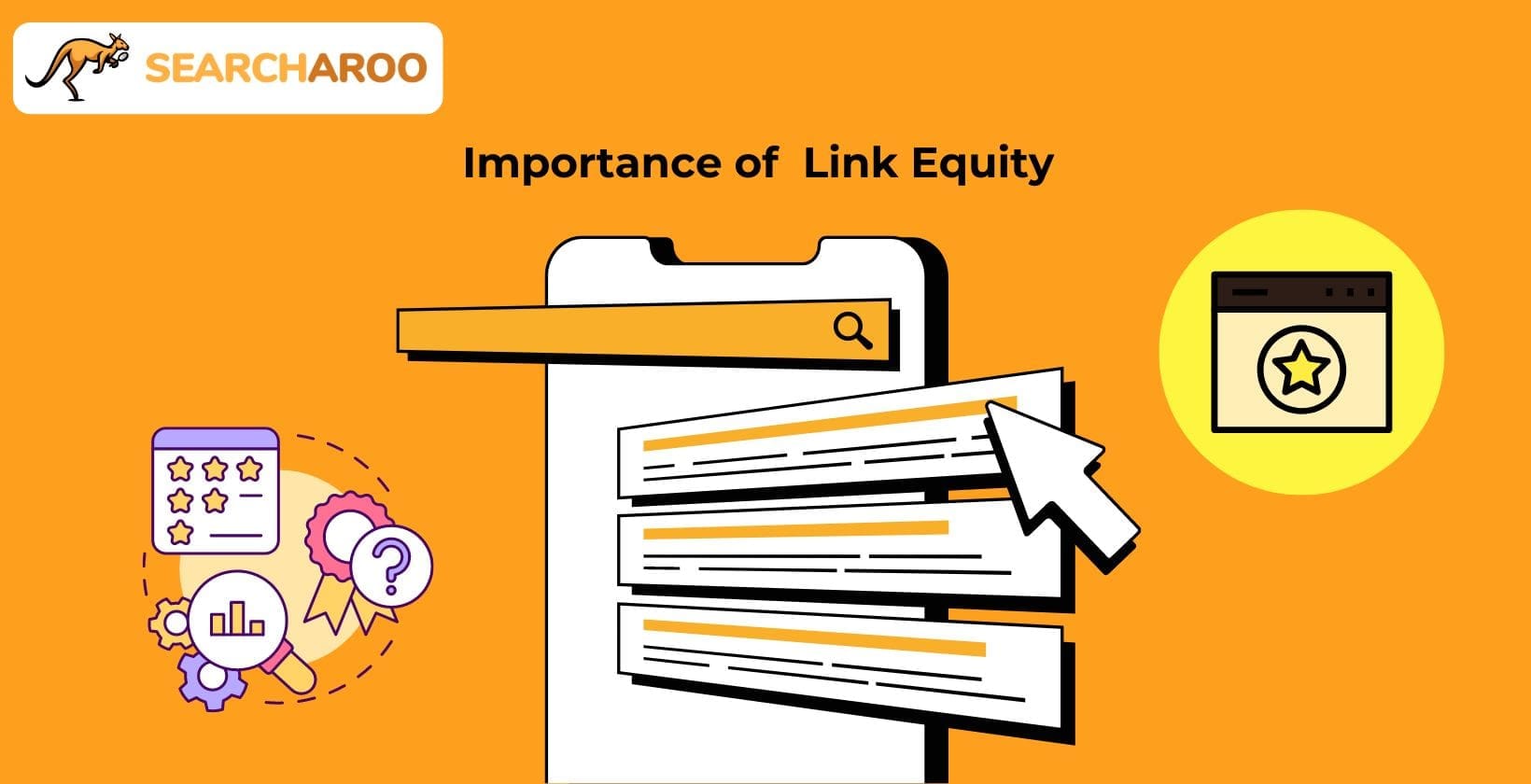
Your search engine page rank involves many different factors. You can tweak many things on a web page that allows it to rank higher than other websites in search results, and the link equity your site earns is one of them.
Higher link equity means you rank higher in search results for relevant topics. This means more attention, traffic, and a wider audience for your site – as long as search platforms see your site as relevant and trustworthy.
Link equity measures how many sites trust yours. When you gain link equity, search engines view it as a digital “thumbs up” from the linking page, enhancing your SEO rankings. Below are reasons why link equity is important.
Enhancing Page Performance
Link equity improves the search ranking power of the destination page, allowing it to boost the page rank of any web page directly.
While a single link might not have that much impact, many links from trusted and relevant pages work.
This makes link-building efforts invaluable for anybody trying to rank websites above their competitors, as it boosts the linked page in an exact direction.
Ranking Sites Higher
Naturally, more link juice also translates to a higher site. Since link equity is a measurement of trust, it also boosts factors like domain authority, representing your site’s overall authority, value, and power.
While the ranking algorithm is very complex for most search engines, getting more (and better) links will almost always boost your rankings in search results if you do this correctly.
Outsource SEO services can provide valuable expertise and resources to enhance your link-building strategies and improve your website’s search engine rankings.
Increasing Visibility
More link juice in the right places can push your site into search results for relevant topics.
This naturally means your site appears more often for people within that niche or market, even if they are not clicking on your page.
Boosting your link power in the right contexts can significantly expand your target market or increase your visibility within your current audience. Strategic link reclamation helps recover lost or broken links, enhancing your site’s authority and visibility across diverse online platforms. This brings us to how link equity is determined.
How is Link Equity Determined?
Link equity is determined by multiple factors including the linking site’s authority, relevance, and trustworthiness, which search engines measure through complex algorithms. Getting more link equity requires strategic approaches beyond simply accumulating internal and external links.
Not only can some links offer incredibly low link juice (or even damage your overall rankings), but you can’t just get links from any site.
Relevance is key: valuable links irrelevant to your site (or even the pages they link to) can be a huge waste of potential.
Link Relevance
The link value of a page is not set in stone. Even an incredibly respected and popular site will not gain much link juice if the target page is irrelevant to the page the link is coming from.
This means keeping things relevant when building a link from one page to another is important. Link equity works best within a single niche, where the websites are relevant to one another, and both the linking and linked page are also focused on similar topics.
Quality, Not Quantity
How many links you build does matter; there is no such thing as too many links.
However, link quantity is usually not as important as link quality – this does not just mean that you need to keep the link relevant but also that the outgoing links come from a good site.
Spammy links from low-quality websites will not contribute much to your overall page authority, which means the linking page does not offer much to the recipient site. Quality links – those from trusted and authoritative websites – are the ones that matter most.
Link Variety
Simply spamming links from one site will not work. Search platforms only care about one link from one typical site to another distinct site, so even if you have dozens of links from one website in your website’s backlink profile, only one will count.
More links from various sites and topics provide the most link equity on a large scale since you are covering more topics and gaining extra link juice.
Link Context
Context is important. While you will not get less link juice if your link is not placed in content that directly uses a precise term, you always want to place links in content that has topical relevance to the site it is going to.
Anchor text matters for this. The anchor text is the text over which the link is placed, specifically meaning the pieces of text the user would click to follow the link. If the anchor text is not surrounded by anything, giving it actual context, that link becomes less valuable overall.
Link Location
Not all links are handled equally. For example, in some cases, footer links in a blog post will be valued lower than those in the main body of a larger article because there is less content to provide extra context.
Site Security
Any page using HTTP instead of HTTPS loses link juice due to its outdated and less secure nature, significantly reducing its potential link equity. This brings us to the question of whether both internal and external links transfer link juice.
Do Both Internal and External Links Transfer Link Juice?
Internal links transfer link equity throughout your website by distributing authority from stronger pages to weaker ones within the same domain. Internal links matter as much as external links when link equity is involved, though they redistribute existing authority rather than bringing new authority from external sources.
However, internal links do matter. They help both Google’s crawler/spider bots explore your site, allowing them to check link juice more effectively before their “crawl budget” is used up and they stop indexing your site.
In other words, internal links allow for proper navigation, which benefits both search engines and regular human visitors. Proper internal linking is important for keeping your site architecture easy to navigate, another ranking factor many search engines care about.
Do Nofollow Links Carry Link Equity?
Nofollow links do not pass link equity. Therefore, avoiding nofollow links is vital during link building since they have less impact than internal linking and provide no benefit.
This means that they are not even considered when your site is ranked on search engine results pages and have absolutely zero value regarding SEO. However, they still draw organic traffic from users who click the links.
These links do not benefit other pages directly, so the SEO community avoids them whenever possible. This brings us to whether you should focus on link equity.
Should You Focus on Link Equity?
While link equity might be a measurement that you never even noticed before, Google noticed, and it will have run through the ranking calculations on all of the other pages on your site in the meantime.
Whether you think link equity and domain rating are worth targeting as a top priority, it is important to understand that they will always be factored into your rankings. If you want to boost your search presence, it is important to focus on them eventually.
Summarising Link Equity Strategies and Benefits
Link equity is a fundamental aspect of SEO that directly influences your website’s search engine rankings. Maximizing link equity requires strategic approaches such as creating link-worthy content, building relationships with authoritative sites in your niche, optimizing internal link structure, and regularly auditing your backlink profile to remove toxic links.
You can effectively boost your site’s link juice by obtaining high-quality, relevant backlinks, ensuring proper internal linking, and avoiding nofollow links. Link equity is just one part of a comprehensive SEO strategy, but its impact on your overall search presence is undeniable. Prioritising link equity will eventually lead to better search rankings, increased traffic, and greater success for your website.
